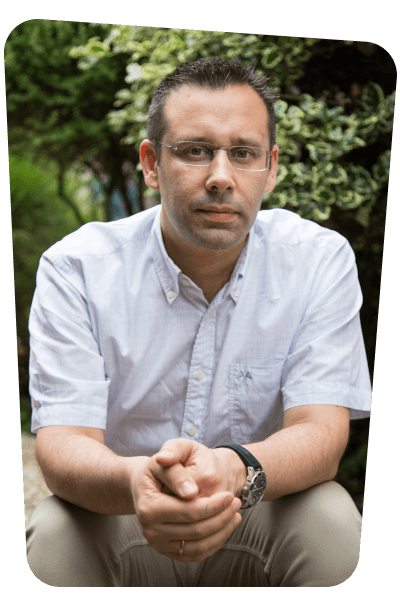
Travel to Spain, and you’ll find Universidad de Santiago de Compostela, an educational institution with more than 500 years of rich history and teaching tradition. Since its founding, the university has grown into a major cultural and historical center with more than 2,000 professors and 30,000 students, and substantial infrastructure to support research.
Dr. Fernando Fraga Varela is a key part of this work, serving as both a professor of pedagogy for the university and a researcher with the Grupo de Investigación Stellae (Stellae Research Group). With 23 years of educational experience, Dr. Fraga Varela finds joy in preparing future teachers. He teaches courses about primary education teacher training, didactics, curriculum, educational technology, and a higher-level class on evaluation.
The relationship between teachers and educational technology
When he’s not instructing, Dr. Fraga Varela is heavily involved with the Stellae Research Group to research ways to improve teaching and learning. Dr. Fraga Varela currently serves as Principal Investigator for a European research project in addition to two endeavors funded by the Spanish government.
“My main research interest is the relationship schools and the training of future teachers have with educational technology. I have always been very interested in studying the potential of educational technology in training processes and all of its possibilities,” said Dr. Fraga Varela.
In his recent research, The impact of serious games in mathematics fluency: A study in Primary Education, Dr. Fraga Varela, along with Dr. Esther Vila-Couñago and Dr. Esther Martínez-Piñeiro, studied the power of serious games (digital games designed for learning) in primary education classrooms, specifically in regards to the impact on students’ math fact fluency. In the quasi-experimental study, elementary students in Galicia, Spain, used ExploreLearning Reflex in real classrooms and completed pre and post-math tests to measure changes in fluency. The research found that students who used Reflex showed a “significant improvement in mathematics fluency,” and gamification promoted even greater student progress compared to classrooms that did not use Reflex.
The road to Reflex
Reflex is an adaptive and game-based math fact fluency solution available to students in English, Spanish, and French. Reflex continuously monitors students’ performance to help them achieve accomplishments at their own pace while motivating students along the way with rewards for progress and effort.
Dr. Fraga Varela discovered Reflex after hearing a colleague was using it in a classroom in the United States. “A schoolmate who was working in Utah told me about Reflex. She encouraged me to try the free account. At that time my children were studying primary education and I decided to try Reflex with them. When I saw the software, its design, and its proposal, I decided to study Reflex in depth in real environments,” said Dr. Fraga Varela.
“Reflex includes a very robust design for the needs of teachers. Reflex is not only a serious game, but it includes dashboard tools for teachers, the ability to manage users and teachers in the system, and the possibility to share results with parents. Students can monitor their own progress and receive rewards within the sessions themselves. Everything is coherent and aimed at strengthening their mathematical learning.”
“Everything is coherent and aimed at strengthening their mathematical learning.”
“Todo es coherente y encaminado a fortalecer su aprendizaje matemático.”
-Dr. Fernando Fraga Varela
Improving math fact fluency using gamification
Reflex is gamified throughout to drive student engagement and learning. Each Reflex session begins with Crabby’s Fact Fair, where students complete carnival games to practice facts learned in previous sessions. Students then receive explicit instruction to learn new facts and complete game-driven coaching practice activities. Students then build fluency through exciting, adaptive games. In the Reflex Store, students can spend their earnings to customize their gaming experience, with choices including avatar accessories and Progress Tree decorations.
“The impact of gamification on learning is very high. The research data shows performance improvements in one month of work equivalent to more than a year with traditional methodology. And here is the key– both the design of the software is a serious game in addition to the gamification mechanisms available to teachers. The combined use of these two mechanisms improves performance as observed in the studies carried out,” said Dr. Fraga Varela.
“Reflex uses a game structure very similar to the one that prevails in students' realities today. The software has many similarities with children's culture since video games are frequently present in their homes. This ability to use the same language guarantees that it is a familiar and close environment for them. The feedback that teachers manage, along with the information offered by the system, improves their connection with Reflex.”
The impact of Reflex
Through his research and firsthand experience, Dr. Fraga Varela concluded that Reflex’s design is clearly optimized for school environments. In an additional study, Serious Games and Mathematical Fluency: A Study from the Gender Perspective in Primary Education, Dr. Fraga Varela and colleagues found that Reflex positively impacted both boys and girls during math instruction. “The data shows the same performance regardless of whether students are boys or girls,” said the researcher.
“Reflex is a proposal with a clear and positive impact on student performance in mathematical operations,” said Dr. Fraga Varela.

“Reflex's approach has a clear and positive impact on student performance in mathematical operations.”
“Reflex es una propuesta con un impacto claro y positivo en el rendimiento del alumnado en las operaciones matemáticas.”
-Dr. Fernando Fraga Varela
Photo source: https://stellae.usc.es/index.php/es/8-actualidad/10-fernando-fraga-varela
Each day is different for Dr. Fraga Varela between researching, writing, and teaching, but his mission remains the same. “What I like most is that, thanks to the Department and especially the Stellae Research Group, I can make a contribution, undoubtedly modest, to the improvement of schools and education.”
Note: All quotes for this publication were translated from Spanish. Learn more about Dr. Fernado Fraga Varela and read his other research publications.